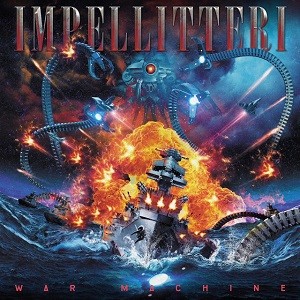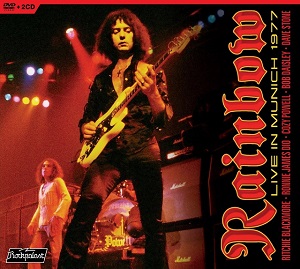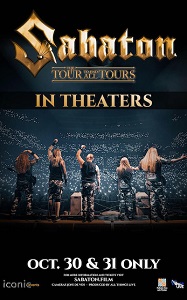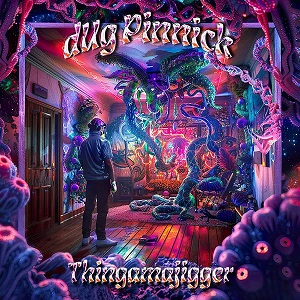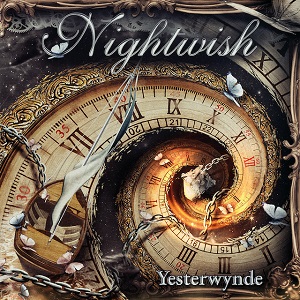EPICA - Strings Attached
April 25, 2009, 15 years ago
Let’s face it, there’s nothing all that impressive these days hearing a symphonic metal band boasting about having performed live with a real orchestra and / or choir. Most bands part of this not-so-exclusive club have been there done that, not to mention veteran traditional metal / rock acts like Metallica and KISS padding their catalogue with similar experiences. Nope, these days it comes down to the guts of the production, namely the material performed as part of this sonic facelift. It’s for this reason that Epica’s showcase of their live orchestral June 2008 show, The Classical Conspiracy, puts the band pretty damn high on the hill within their genre. A one night stand in the Hungarian town of Miskolc, The Classical Conspiracy featured a set of classical scores – many of them from popular movie soundtracks – and a second set of Epica songs boosted with flesh-and-blood classically trained musicians. It was a gripping and powerful musical experience, a definite high point of the band’s career that most certainly bears repeating.
Prior to addressing Epica’s classical adventure, however, there is the matter of vocalist Simone Simons’ health. In January 2008, mere weeks after The Classical Conspiracy show had been confirmed, Simons revealed she was suffering from MRSA (Methicillin-Resistant Staphylococcus Aureus) – a potentially fatal infection if left untreated – which forced her to halt all touring activities in the interest of her recovery. Rather than cancel a planned North American tour with Symphony X and Into Eternity in support of The Divine Conspiracy, Epica called upon studio backing vocalist / collaborator Amanda Somerville to fill in. It was an arrangement that made perfect sense in the band’s eyes, and Epica fans embraced Somerville’s efforts for the most part, but one can only assume it was tough on Simons seeing someone else fronting the band she helped build from scratch.
“Yeah, it was,” Simons affirms. “On one side I felt really bad because I was holding the band back, and on the other hand the band is like my baby, so for me to have to sit at home while I was sick while the band was out having fun without me was hard. It was 50-50, but Amanda is a good friend of mine and I knew I could rely on her to do a good job, and she did. She also had a good time even though it was tricky for her to go in my place. I think she handled it well.”Indeed she did, although Somerville’s debut as Epica’s voice didn’t go as smoothly as she would have liked. She elaborates…
“I was insanely fucking nervous for the first show,” says Somerville. “Probably more nervous than I've ever been for anything before in my life, because we not only hadn't rehearsed once, it also turned out that we couldn't even have a soundcheck before the first show. Time had run out because Symphony X needed so long with their stuff, so they told us three hours before the show that there wasn't going to be able to be a soundcheck, just a short line check about 10 minutes before showtime. I freaked out. I couldn't even put on my earrings because my hands were shaking so badly. Then, during changeover, they couldn't get my in-ear monitoring system to work. But – thank goodness – everything turned out okay in the end. But holy HELL! I was nervous...”There are no regrets on either side. Simons and Somerville remain close friends and were in the studio at press time working on Epica’s next record.
“I think it was wise that I chose to stay home,” says Simons, “because when you’re still in that phase where the tests are coming back positive you start worrying that something could happen while you’re out on the road. That can make you crazy. It’s better to be at home in that situation in case something happens than to risk getting sick on tour and having to stop everything. That period was a real nightmare, but it made me appreciate that I’m healthy now even more.”The experience made The Classical Conspiracy even more of a triumph for the band. Putting it together was a massive undertaking that demanded months of preparation. Given that it was a single show with only a live album and fan-filmed YouTube video to show for it, you have to wonder if it was worth the stress. For Simons the answer is a resounding yes.
“First of all, we always play with backing tracks, so the choir and those arrangements are one of the biggest elements in our music, and it’s always been a dream of ours to play with a real orchestra. We did it once before three or four years ago at a private party, and we were approached by the organizer in Hungary about doing this when we were on tour with Sonata Arctica. He’d done a similar thing with Therion, and even though we didn’t know what to expect we were still interested because in a situation like that we would be able to really bring the music to life. Having a real orchestra and a real choir around you, that’s so amazing and so beautiful, so of course we said yes.”“We had to decide which classical songs we were going to play, and which Epica songs would be in the set,” Simons continues. “Oliver (Palotai/Kamelot keyboardist) arranged the Epica songs for the orchestra we were going to play with, so it was a big job. We were in Hungary for a week to rehearse, so it was a lot of work, and for me the show itself was really stressful because we had a rehearsal on the same day at 10:00am and then the show in the evening. It was a really long show – one hour of classical music, one-and-a-half hours of Epica – and I was nervous because normally I perform with backing tracks, and they never make mistakes. Now I was working with a choir, which of course isn’t perfect, so it felt a little bit different because the rock I normally leaned on had changed, if you know what I mean.”
Palotai offers some insight as to his behind-the-scenes role. The way he tells it, the procedure was anything but a cakewalk.
“The Epica job was mainly about notating and partially arranging the songs. It was a huge amount of work, about two months straight, every day for 8 - 10 hours. The biggest challenge is that an arrangement with virtual strings like on the records is different to a real player. Many lines already existed, of course, but you can't just copy them 1:1 for a musician.”“Regarding the volume for certain instrument groups, you don't have to worry about recording a CD,” Palotai adds. “You just put them lower or louder in the mix. For a live orchestra setting that's a totally different matter. Suddenly the brass section, for example, buries the most important string line if you're not careful.”
Asked if she’s happy with the final result, Simons admits to being surprised by how well things turned out.
“I have to say, yes, because I was really tired during that show and I had to give everything to make it happen. Right before the show I took a bad step and I was wearing high heels, so I hurt my hip really bad. When you’re on stage you try to block out the pain and the nerves and give everything you’ve got, but afterwards you’re a little bit scared to listen to the recordings (laughs). Having a live CD means having mistakes here and there. You can’t re-record everything and make it sound perfect. We’re not robots, and it was a huge collaboration. Some songs you can hear that I’m really up for it. I’m very happy with how it turned out. I was blown away by how things sounded, but the orchestra was blown away by Ariën (van Weesenbeek) because he was sitting so close to them (laughs). They were shocked, and it’s kind of weird asking a drummer like him to play a little softer (laughs). I actually have that problem when we play small stages because my mic picks up the drums.”“I think the next time we do it we should make a DVD out of it,” she adds, clearing up why there’s no official video footage from the show. “Because there was a short term preparation for the performance we didn’t have time to arrange it. If you’re going to make a DVD it has to be nice, it has to really capture the feel of the performance. You can’t put out a half-finished product.”
According to Simons choosing the setlist came down to making things as comfortable as possible for non-Epica fans in the audience on the night without sacrificing too much of their signature sound. Only the most jaded Epica fan will find something to complain about as the CD plays on, and it’s not beyond imagining some classical aficionados will add it to their music collections.
“All of us are movie freaks, and I think I’m the worst because I’ve got something like 1,000 DVDs here at home (laughs). It was actually to be expected that we would do some film scores, although I was expecting we’d do some stuff from Gladiator. We discussed the set with the organizer, and he asked that we work things out so there weren’t too many grunting vocals because the Epica show was only one part of a classical music festival. People who weren’t familiar with metal would be attending and the fear was they’d be shitting their pants (laughs). We couldn’t do some songs, and others we had to rearrange. We even had one of the tenors from the choir added to ‘Consign To Oblivion’ in place of Mark’s (Jansen/guitars) vocals, but it didn’t sound that great so we decided to do it ourselves. That’s a song that we had to have in there because we’ve been using it to end our shows for years, and if it wasn’t there I think things would have felt incomplete.”“The funny thing is that there were chairs in the hall so people had to sit down, but the fans only stayed seated for a minute or two. They wanted to take pictures and shoot video, but the classical fans who were unfamiliar with Epica stayed sitting, so I think it was a bit uncomfortable for them. But as far as I know everyone was pleasantly surprised to hear Epica play 100% live.”



